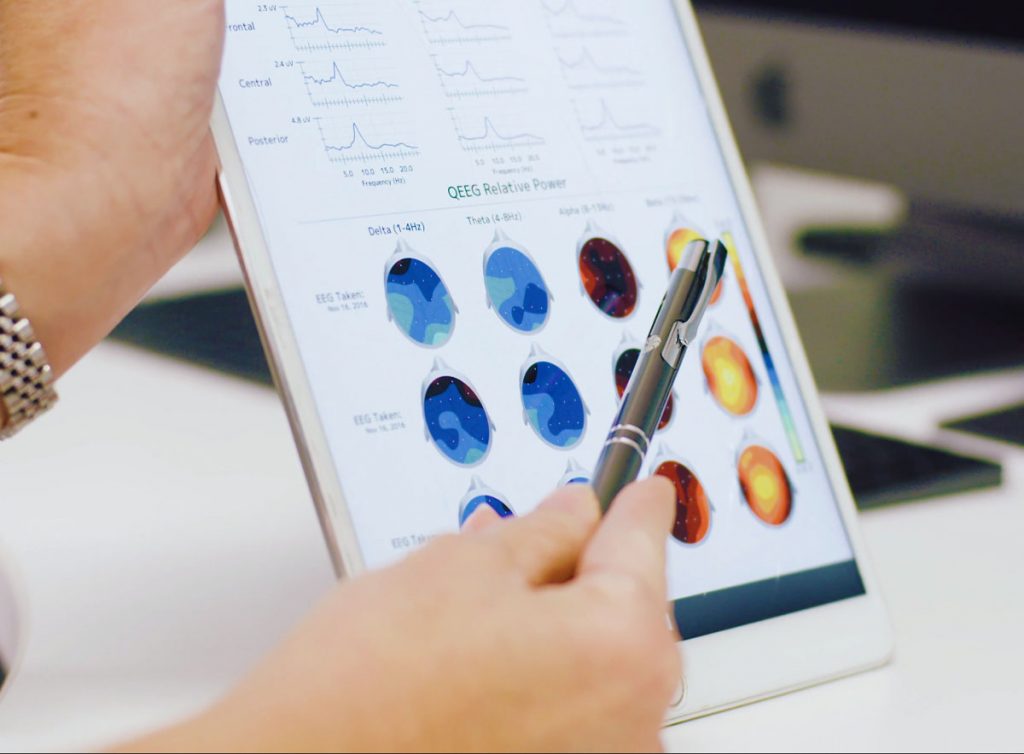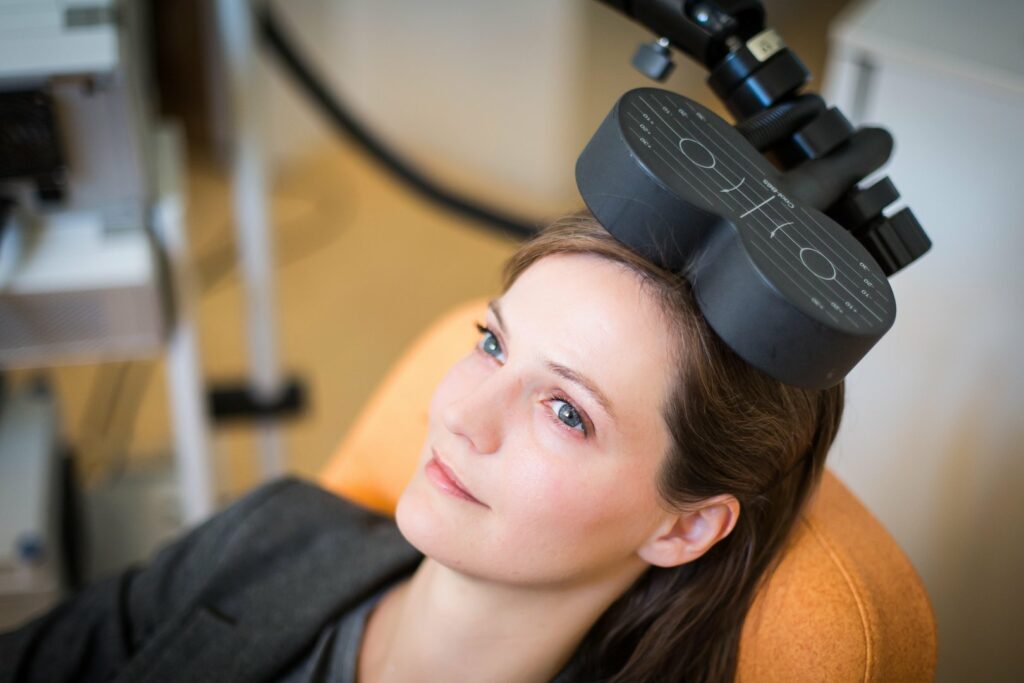
MeRT Treatment for Postpartum Depression
A Breakthrough Treatment to Relieve
Your Postpartum Depression Symptoms
We offer this non-invasive, drug-free treatment under the care of a board-certified doctor.
MeRT can provide lasting results, even when other treatments or medications have not worked.

Call our New Patient Coordinator
Or fill in the Contact Form Below
You CAN Overcome Postpartum Depression and Find Joy Again
Postpartum depression can turn one of the most joyful times in life into one of the most painful.
The new mom’s “baby blues” — mood swings, crying spells, anxiety, difficulty sleeping — will go away after a couple of weeks.
With postpartum depression, these symptoms don’t go away, can be more severe, and can last for several months or longer.
Plus, depression not only affects the mother but also affects the baby and the other parent.
While many treatments exist for depression, like therapy and medications, they don’t always work. They may also have side effects that can be hard to tolerate.
But don’t give up hope. We deliver a breakthrough depression treatment right here at Brain Treatment Center Atlanta. It’s called MeRT, (Magnetic EEG-guided Resonance Therapy).
MeRT is an FDA-approved treatment for multiple drug-resistant depression. It works by improving brain communication and function through gentle magnetic stimulation. MeRT is drug-free, non-invasive, and well-tolerated — and can achieve lasting results.
Postpartum depression is not your fault. It doesn’t mean you’re a terrible parent. We can help relieve your depression symptoms so you can truly experience the joy of this incredible time of your life.
What is Postpartum Depression?
Postpartum depression (PPD) is more common than you may think, affecting one in seven women in the US.
PPD is caused by biological, physical, and chemical factors beyond a woman’s control. While the exact cause of PPD is not fully understood, it is thought to be a combination of factors, including:
- Hormonal changes: After childbirth, a sudden drop in estrogen and progesterone levels can trigger mood changes.
- Genetics: A family history of depression can increase the potential for developing PPD.
- Personal history: A history of mental health conditions, such as anxiety or depression, increases the risk.
- Life stressors: Stressful life events, such as financial problems, relationship problems, or the death of a loved one, can also increase the risk.
PPD can make it hard to complete everyday tasks and to care for your baby.


No matter the symptoms, there is hope for your postpartum depression.
The MeRT treatment plan is highly individual.
By improving brain communication, we can achieve significant results.
Symptoms of Postpartum Depression
The symptoms of PPD can vary from mild to severe, and they can last for weeks or months. Some common symptoms include:
- Feeling sad or hopeless
- Loss of interest in activities that were once enjoyable
- Crying spells
- Fatigue
- Changes in appetite (either loss of appetite or overeating)
- Difficulty sleeping or sleeping too much
- Thoughts of harming oneself or the baby
- Feeling worthless or guilty
- Difficulty bonding with the baby
- Withdrawal from family and friends
If at any point you have thoughts of harming yourself or your baby, immediately seek help by calling 911 or your local emergency assistance number.
MeRT Treatment for Postpartum Depression: How It Works
MeRT is a drug-free, non-invasive treatment that uses a magnetic field to stimulate and balance brain function. Sophisticated imaging and diagnostics guide the MeRT treatment.
Specifically, we perform a qEEG (quantitative electroencephalogram), also called brain mapping. This qEEG is key to the success of MeRT. Here’s why:
New research shows how the altered activity of certain neural circuits in the brain may contribute to depression.
By mapping the brain, we can clearly see any imbalance in brainwave activity. Then, through a highly personalized treatment plan using TMS (transcranial magnetic stimulation), we can strengthen the connections in the brain.

MeRT treatment has shown a significant reduction in depression symptoms.* And these results are long-lasting. Plus, MeRT is FDA-approved for Multiple Drug Resistant Depression.
* Results are based on active and strict observation of our regimens. Results may vary based on the individual user and are not guaranteed.

Benefits of MeRT Treatment
While no two patients are alike (as no two brains are alike), some of the most common benefits reported from MeRT treatment are:
- Improved sleep quality
- Increased sleep duration
- Reduced symptoms of stress
- Improved mood
- Better attention span
- Reduced pain
- Increased concentration and focus
- Improved emotional stability
- Increased sociability
- Improved clarity of thought
- Increased motivation
- Decreased cravings (e.g., for drugs and alcohol)
- Increased ability to adapt to change
- Improved self-confidence and self-esteem
The Steps of MeRT Treatment for Postpartum Depression
Your first step to determine if MeRT is the right treatment for you is to call our New Patient Coordinator. She can answer any questions you have about the treatment, protocols, cost, and payment options. Then, once you decide to move forward, we will set up your first two appointments for testing and consultation. Each of these appointments will last 45 minutes to an hour. After this, you will have a two-week assessment period where the actual procedure and monitoring take place.

1. Testing
At your first appointment, we will perform the qEEG and ECG/EKG. These tests are simple and painless and are done right in our office. For the EEG, we place a cap on your head to measure the electrical activity in your brain and map out any areas not performing as they should. For the EKG, we attach a simple electrode to your chest to record the heart’s electrical signals and measure the brain/heart coherence.
Once we complete the tests, our team will carefully analyze the results. Based on this analysis, we develop a treatment plan customized to your specific condition. We then schedule your assessment period of treatment.

2. Consultation
Your second appointment, after your qEEG/EKG, is a one-on-one consultation. You can do this either in person or virtually from the comfort of your home.
We will discuss your test results and treatment protocols, answer any questions you may have, and let you know more about what to expect during your assessment period of treatment.
Should you choose to go ahead with the assessment period, the cost of the qEEG and consultation will go toward the assessment period pricing.

3. Assessment Period
In the two-week assessment period, we will perform a short course of treatment followed by a new EEG to see how you are responding.
The first week of treatment will last for five days, Monday through Friday. The second week of treatment will last for four days, Monday through Thursday, followed by new testing on Friday.
We determine progress based on the new EEG results compared to the initial one done and symptom improvements.
If we see a positive response to treatment during the assessment period, you will have likely noticed some improvements. At that point, we will schedule additional MeRT treatment in two-week intervals.
We will do qEEG/EKG testing every two weeks and have follow-up consultations to track progress. Most conditions treated with MeRT show lasting effects after six weeks. However, each patient is different, and your results may vary.
Questions About MeRT or rTMS? Contact Our New Patient Coordinator
We understand how difficult and concerning it can be to be dealing with postpartum depression symptoms. We also know that you may have many questions about MeRT.
Before deciding to start treatment, you can take some simple steps to determine if you will benefit — non-invasive diagnostics and a consultation with our doctor.
And before even that, a consultation with our New Patient Coordinator can help to better understand the various steps and how it all works.
She is here to answer all your questions and explain our protocols. She can also assist you in getting scheduled should you decide to move forward with the initial testing and consultation.

Call our New Patient Coordinator
Or fill in the Contact Form Below
Contact Form
For more information or to speak with our New Patient Coordinator, please fill in the information below.